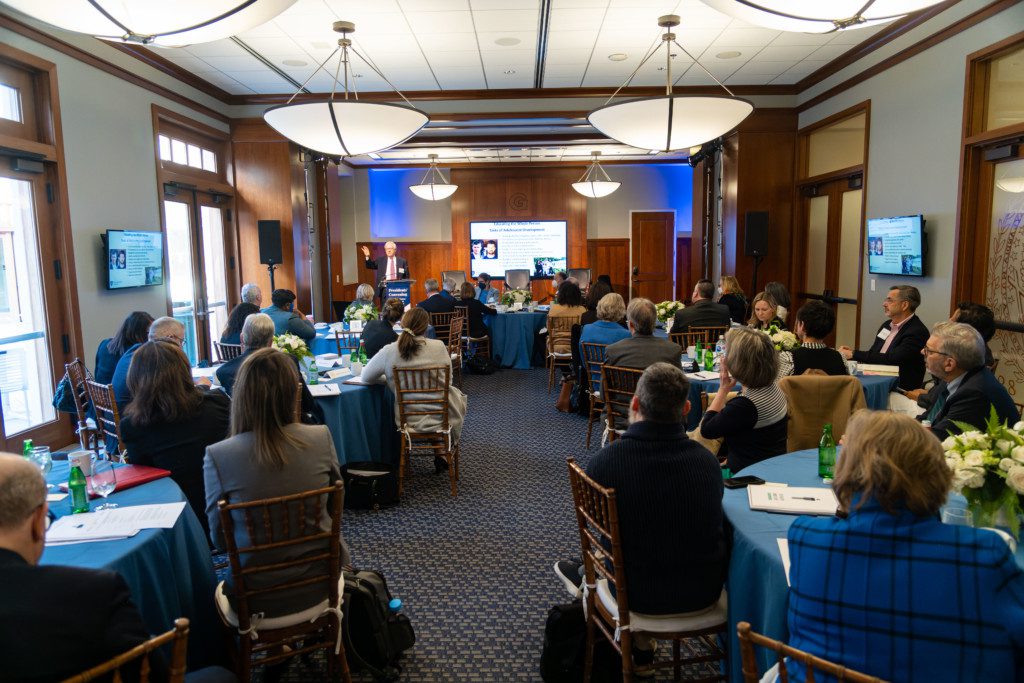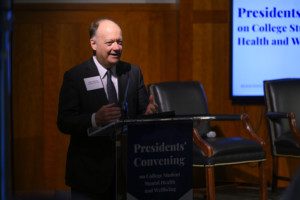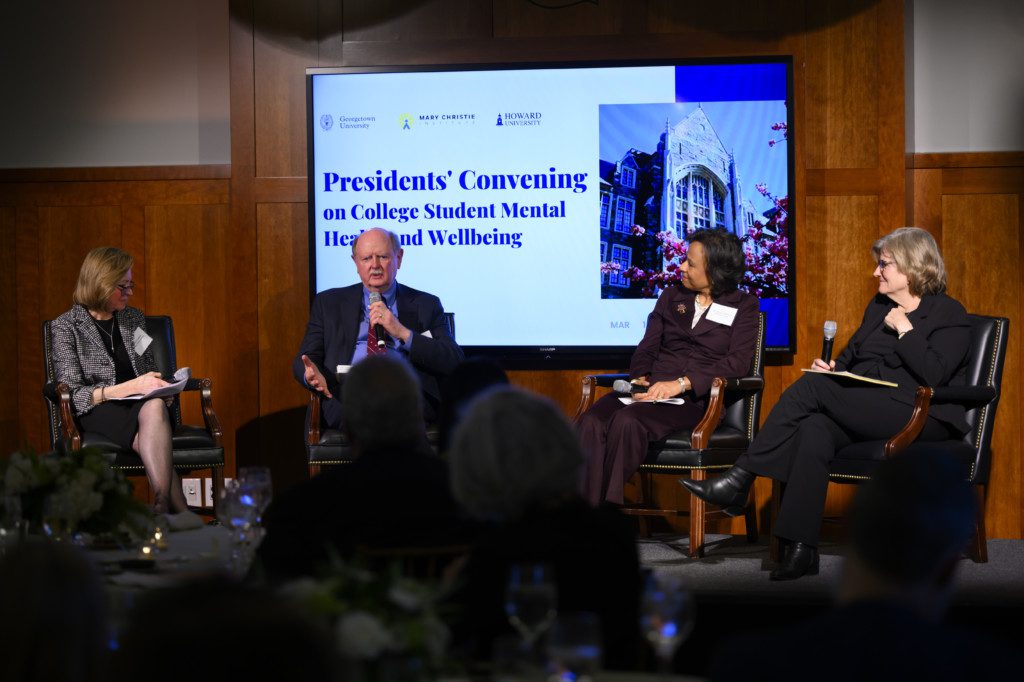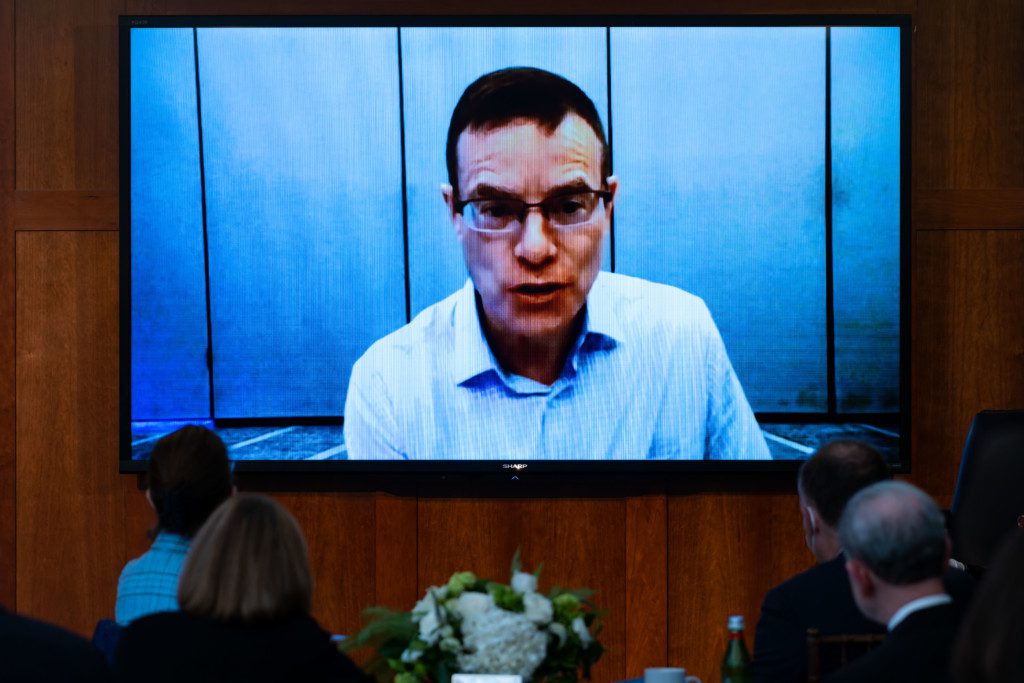Report on the Presidents’ Convening on College Student Mental Health and Wellbeing

On March 13 and 14, 2022, twenty college and university presidents met at Georgetown University to discuss student mental health and wellbeing, a topic of great concern within higher education leadership even before the onset of the COVID-19 pandemic. The Presidents’ Convening on College Student Mental Health and Wellbeing, sponsored by the Mary Christie Institute, Georgetown University, and Howard University, provided the leaders an opportunity to learn from one another as well as from the experts in the room about an issue that presidents report is their number one concern.

Georgetown University President John J. DeGioia.
Georgetown President John (Jack) DeGioia provided a warm welcome as well as a much-appreciated acknowledgement of the toll the past two years has taken on the emotional and behavioral health of the higher education community, including the presidents themselves. The program was intentionally theoretical and focused on environmental strategies, involving policy and cultural changes needed to engender improved mental health. Student flourishing was a major theme.
The Convening program examined and invited discussion on the major milestones students face and institutions navigate in stewarding their emotional and behavioral health – how students arrive, how they experience college, and how they enter the workforce. The first session shed light on entering students with a focus on students making the transition from secondary school. Underlying questions in this section included: How Gen Z students’ emotional and psychological profiles may differ from other generations; What contributes to their collective trauma; What their individual differences are; and to what degree these experiences and identities matter in how they will thrive at college?
Dr. Nicholas Covino, President of William James College, facilitated the opening session and underscored the critical need to acknowledge the distress students are reporting. Dr. Emma Adam, a professor and Associate Vice President for Research at Northwestern University, presented on the reported mental health of Gen Z students, with data on increases in stress, depression, and anxiety. Adam, who was the adolescent mental health advisor to the Stress in America survey for Harris, spoke of major influences on their mental health including the social and biological changes of late adolescents; causes of stress including social media use, academic and extracurricular stress; economic anxiety; parenting influences; and socio-political stresses such as climate change, political polarization, and racial trauma. Dr. Adam offered several intervention strategies including highly visible messaging and policies that evoke feelings of belonging, saying “Inclusion and feelings of belonging are keys to calm, learning, and mental health.”
Dr. Emma Adam on trends in young adult mental health.
In “Understanding the Profile of our Students, Part II”, Dr. Sofia Pertuz, Managing Director for Diversity, Equity, and Inclusion (DEI) at Billie Jean King Enterprises and External Advisor to The Jed Foundation, spoke of the need to change the way we think about our institutions to accommodate the profound changes that have occurred since the pandemic, and the social and political upset caused by events such as the death of George Floyd.
Increases in bias and hate crimes, a rise in student activism, and demand for equity are strong dynamics at play on American campuses, she reported. Identity and intersectionality are more important than ever to today’s college students, indicating wide-ranging diversity in terms of race, gender, sexuality, age, ability, etc. Equity gaps persist, and have potentially widened, in terms of how students of different sub-populations experience college and present and seek help for mental health issues. She urged institutions to think of themselves as “student-ready colleges” as opposed to simply expecting “college-ready students,” with strategies such as collecting data on students before they arrive and acknowledging there is no “one-size-fits-all” approach to student mental health.
Dr. Sofia Pertuz on an expanded definition of identity.
The next section of the program involved nurturing student flourishing and positive mental health during the college experience. Marion Ross Fedrick, President of Albany State University, introduced a presentation by Dr. David Germano, Executive Director of the Contemplative Sciences Center at the University of Virginia and founding Executive Director of the Flourishing Academic Network; and Robert Roeser, Professor of Human Development and Family Studies in the College of Health and Human Development at Pennsylvania State University, which is a member of the Flourishing Academic Network.
Dr. David Germano on the need to focus on flourishing.
Germano opened the presentation by describing the founding principles of the Flourishing Academic Network: Believing that every student has the capacity to flourish as individuals, and as part of communities, knowing that today’s students are suffering more than flourishing and that this trajectory is escalating; and asking how universities and colleges can make flourishing their North Star. He went on to describe the definition of flourishing and how institutions can introduce models of flourishing. Germano says that flourishing, while taught in courses such as The Art and Science of Human Flourishing, offered through the Initiative, will ultimately involve policy changes and campus-wide strategies that eliminate barriers and promote pathways to positive mental health.
Dr. Roeser described the Network’s flourishing course which blends experiential and academic forms of learning. He provided data that show that the class was associated with improved attentional skills, social-emotional skills such as compassion and empathy, flourishing and a sense of shared humanity, as well as decreased depression. The Flourishing Academic Network involves major research universities across the country committed to these principles.
Dr. Robert Roeser on the Art and Science of Human Flourishing Academic Class.

Presidents of the Coalition for Life Transformative Education.
The Convening also included insights and perspectives on the ways in which we prepare students for meaningful careers and life-long wellbeing. Gloria Cordes Larson, former President of Bentley University and Board Chair of the Mary Christie Institute, moderated a discussion among leaders of the Coalition for Life Transformative Education (CLTE) – a group of college presidents focused on policy changes that engender identity, agency and purpose in students leading to improved wellbeing after college. They base their work on the 2015 Gallup study, the largest survey of college graduates in history, that explored what, in their college experience, mattered most in obtaining a good job and a good life. The data show it was experiences like “having someone care for me as a person,” mentoring opportunities, and activities in the classroom that linked to real world problem-solving. Graduates who reported having had these experiences were more than twice as likely to report levels of wellbeing and work engagement later in life.
CLTE members Richard Miller, President Emeritus of Olin College; Dr. Paula Johnson, President of Wellesley College; and Clayton Spencer, President of Bates College, spoke of the individual initiatives on their campuses focused on nurturing identity, agency, and purpose including Bates’ Purposeful Work program, a student experience that combines curricular infusion models, practitioner-taught courses, internships, and job shadowing that allows students to identify the kind of work that brings them meaning.

Price Waterhouse Coopers US Chairman and Senior Partner, Timothy Ryan.
Price Waterhouse Coopers Chief Executive Officer, Timothy Ryan, spoke to the presidents remotely in an interview he did with Bentley University President Brent Chrite, who was live at the Convening. Chrite asked Ryan to describe the new corporate environment students will be entering and the kinds of skills and characteristics they will need to thrive in these work environments.
Ryan talked of a new era in the workplace that involves dynamics he calls the Four T’s (+1): Talent – how it will evolve organizations; Transactions – reshaping portfolios and rethinking how they do business; Transitions – specifically in clean energy and technology innovation that has yet to be seen; and Trust – creating trust as an asset going forward. He adds a fifth T which he calls “Terrible Things,” from a global pandemic to geopolitical events that are beyond anyone’s control, further underscoring the need for resilience among our future workforce.
In closing the Convening, Dr. Zoe Ragouzeos, of New York University and the Mary Christie Institute, asked the presidents to submit on index cards what would be their major priority in addressing these issues on their campuses. Dr. Sarah Ketchen Lipson, of Boston University’s School of Public Health and co-Principal Investigator of the national Healthy Minds Study, asked what additional data the presidents would seek in continuing to examine these issues. This information will be used to inform the programming for the next convening, planned for March of 2023.
While the exercise produced several index cards of suggestions of various kinds, some major themes emerged including: a better understanding of what is working in the aggregate combined with campus specific data on mental and behavioral health conditions; linking wellness outcomes to persistence and graduation; tracking positive measures of wellbeing and what is influencing them so we know what is working; understanding more about the barriers to flourishing in the aggregate and on our campuses; engaging faculty in student mental health beyond those in psychology and health sciences.
Information from a post-convening survey given to the presidents also provided insight and input. Of those who participated, 100% said they learned something new and 70% said they would be implementing a policy or program as a result of what was discussed.
